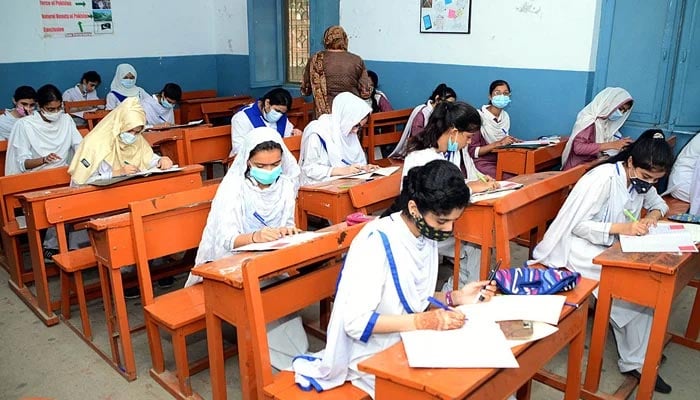In a first, Sindh adopts new grading system for matric and intermediate exams
Sindh is the first province in Pakistan to implement such a system
October 16, 2024

KARACHI: In a move towards modernising the education system, the Sindh government has notified a new grading policy for matric and intermediate exams.
Students of the province will not get marks and positions, but grades, according to a notification issued by the Secretary of Boards and Universities, Muhammad Abbas Baloch, making Sindh the first province in Pakistan to implement such a system.
The new grading policy will be effective from 2025. Under this system, students will be evaluated and awarded grades instead of traditional marks and positions.
The notification further states that the first, second, and third positions will be abolished under the new grading system.
The Inter-Board Coordination Committee (IBCC) has formulated a new grading formula, which assigns grades based on percentage scores.
For instance, students scoring 95% or above will be awarded an A++ grade, while those scoring between 90% and 94% will receive an A+ grade.

In this system, 80-84% will be awarded B++grade (Very Good), 75-79% will receive B+ (Good), 70-74% will get B (Fair), and 60-69% will get C (Above Average).
While Sindh has taken the lead in implementing this new grading system, other provinces such as Punjab, Khyber Pakhtunkhwa, and Balochistan have yet to adopt similar policies.
Lahore-based Educationist Syed Abidi told Geo.tv that the initiative appears to be a positive step towards standardising the grades achieved by students in the 10+2 system (matriculation and intermediate).
"It will enable students to assess their performance better, allowing them to prepare for the next grade and address areas where they may be struggling."
Another benefit of implementing this new grading policy is, he said, that it will familiarise students with the grade point average system, which is already in use at the university level.
"This familiarity will help students adapt more effectively to higher education."
However, the educationist said, there are concerns that the 10-point grading system should also prompt changes in the curriculum, teaching methodologies, and delivery techniques.
He added that incorporating approaches such as critical thinking, inquiry-based learning, and project-based learning through mock exams will encourage students to strive for their targeted grades using this new learning methodology.
That said, he added, adopting such a grading system may still encounter challenges, particularly for students in rural areas. "It may take time for them to become accustomed to and fully understand the grading process, as well as address any questions that may arise."









